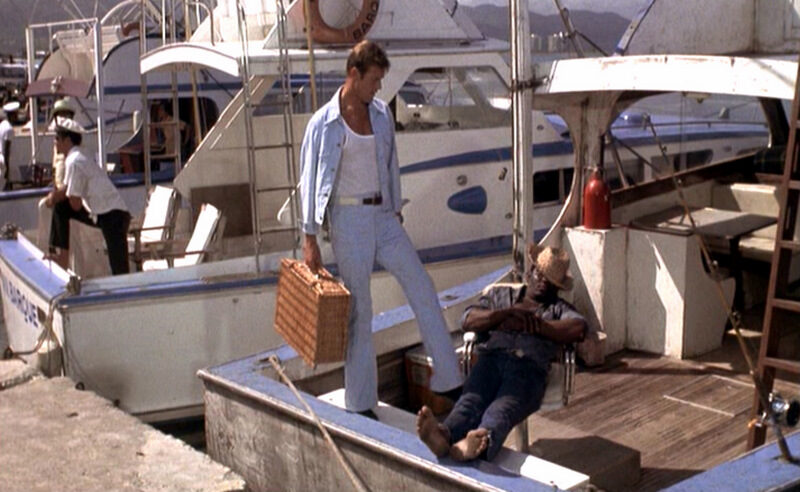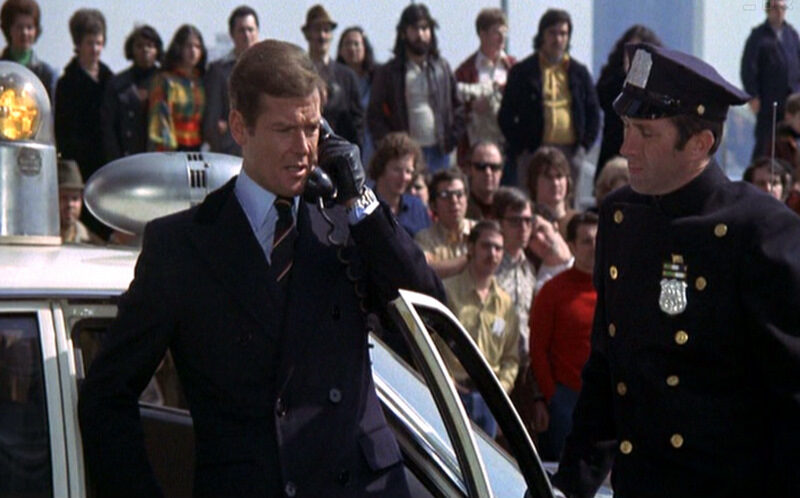Live and Let Die: Roger Moore's Chesterfield Coat |
 © 2009, Clothes on Film 4 Jul ’09
© 2009, Clothes on Film 4 Jul ’09
Live and Let Die (1973, directed by Guy Hamilton) is a fantasy Blaxploitation movie made in the wake of Shaft and Sweet Sweetback’s Baadasssss Song (both 1971).
Roger Moore’s first stab at James Bond pitted his tightly buttoned jackets and high waisted trousers against a bevy of colourful, flared, snap-brimmed seventies street wear as commanded by corrupt diplomat/New York drug kingpin, Dr. Kananga/Mr. Big (Yaphet Kotto). For the first time in his existence the world’s foremost super spy would be all but invisible.
Except that there were attempts to update 007′s image in line with the fashions of the day. Some worked; Moore in a black short sleeve silk shirt with pointed collars at the New Orleans airport for example. Some, however, were disastrous; who could forget the sight of Bond emerging for a day exploring San Monique in a casual blue suit with flares, short jacket in denim western style, white belt and singlet vest? Throw in a knotted hanky on Moore’s head and James Bond could be holidaying in Bournemouth.
Thankfully Moore manages a more successful style coup early on in Live and Let Die: his cropped navy blue chesterfield coat.
It is tempting to assume Roger Moore himself, with his regal The Saint persona and ‘designed by’ wardrobe credit on TV series The Persuaders (1971) had something to do with this. But being as his actual (self confessed) contribution to the world of fashion was to sit on the board at milling company Pearson and Fosters and pick out fabrics, this seems unlikely.
Cyril Castle of Mayfair, London was acknowledged as clothing James Bond during this time, so he deserves merit for keeping the reins on 007′s seventies costume endeavours for as long as he possibly could (experiments in powder blue vacation wear notwithstanding):
¾ Length double breasted chesterfield overcoat in navy blue wool, 6 on 2 button configuration, rear vent, wide peaked lapels and velvet collar. Light blue turndown collar shirt with horizontal striped Royal Navy regimental necktie. Black leather gloves.
The finish on this archetypal Bond winter coat is both classic and contemporary. The look is pure establishment 007; still vaguely in the style of Sean Connery’s younger heyday, the pared down ‘Conduit Cut’ as created by Anthony Sinclair of Conduit Street, London. But from here on in Moore gradually set the tone for a wider, more snugly fitted silhouette. His Royal Navy regimental necktie is less subtle however; the red, white and blue combination blatantly resembling the bold colours of a Union Jack flag.
The chesterfield coat originally surfaced in England during the mid-1800s. This traditionally dark overcoat featured a slightly fitted waist, either as a single breasted or more formal double breasted, and later with a velvet collar and fly front (on the single). By 1900, the coat was widespread in Victorian society in long or semi-long form and has since become the basis for all smart men’s winter coats.
Bond’s chesterfield is shorter than most giving extra length to Moore’s already long legs. His New Victorian sleeve cuffs are finished just far back enough for those similarly styled cocktail cuffs to pop into view. Superficially similar to the Turnball and Asser cuffs sometimes worn by Sean Connery in the role, they are in fact a different shape. It is likely this particular shirt was provided by Frank Foster of Pall Mall, London. The starch neck is cut high and deep, a distinctive and then current look that would soon become a Moore trademark.
If this coat and shirt still resemble young Connery in taste, it is these subtle sartorial touches that lead to Roger Moore becoming immortalised, for better or worse, as fashion Bond. Though in contrast to the outrageous ‘pimp wear’ adopted by Mr. Big’s gang in New York, James Bond comes across like an extremely well dressed foreign ambassador.
This chesterfield look may have dated well, but at the time it must have seemed rather archaic and conformist to the kids. Bond would need to get funkier to draw in the younger crowds. And with his first foray into the world of safari suits for The Man with the Golden Gun in 1974, he did.
Incidentally the actual coat used in the film was sold by auction at Christie’s for around £1,500. Its current owner Lancelot Narayan was kind enough to get in contact and provide some up to date photographs:
© 2009 – 2013, Chris Laverty.











